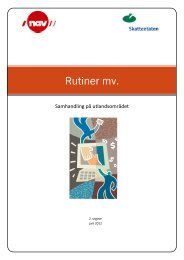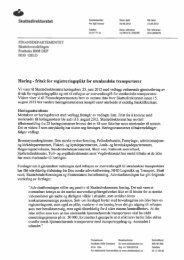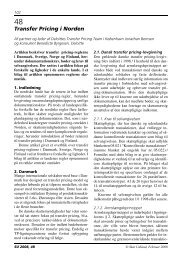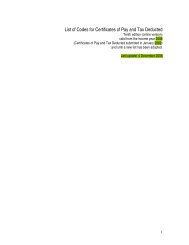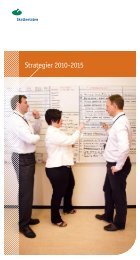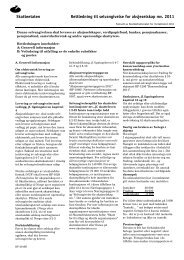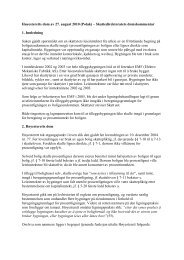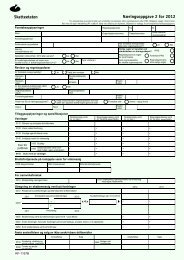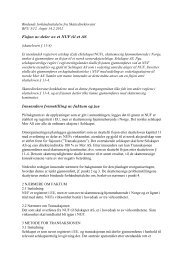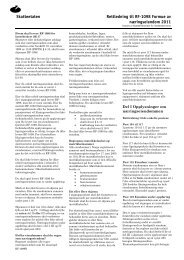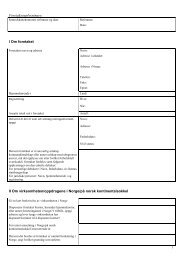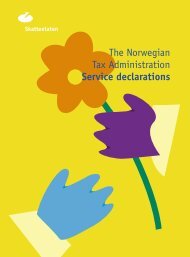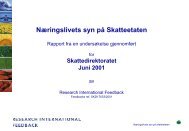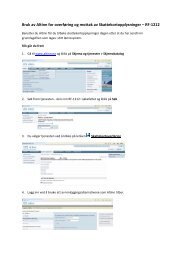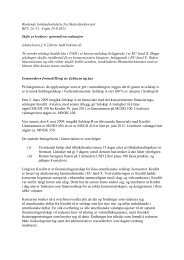Rettledning for utenlandske arbeidstakere og ... - Skatteetaten
Rettledning for utenlandske arbeidstakere og ... - Skatteetaten
Rettledning for utenlandske arbeidstakere og ... - Skatteetaten
Create successful ePaper yourself
Turn your PDF publications into a flip-book with our unique Google optimized e-Paper software.
Which deductions can you claim as a<br />
commuter?<br />
If you have paid the expenses yourself and<br />
are not claiming the standard deduction<br />
<strong>for</strong> <strong>for</strong>eign employees, you can claim a<br />
deduction <strong>for</strong>:<br />
• travel in connection with home visits<br />
calculated at a rate per kilometre. The<br />
number of kilometres is stipulated on the<br />
basis of the shortest travel distance by<br />
road between your housing in Norway and<br />
your home in your home country. You must<br />
be able to document/substantiate the<br />
number of journeys. The rate <strong>for</strong> 2012 is<br />
NOK 1.50 per km <strong>for</strong> up to 50,000 km per<br />
year. For the number of kilometres in<br />
excess of 50,000, the rate is NOK 0.70 per<br />
kilometre. You can claim a deduction <strong>for</strong><br />
the actual cost of ferry and air travel, but<br />
you cannot also claim a deduction at the<br />
standard rate <strong>for</strong> the distance travelled by<br />
ferry and air.<br />
• what you have paid <strong>for</strong> accommodation<br />
(rent costs). You must be able to present<br />
receipts <strong>for</strong> the amounts.<br />
• extra subsistence expenses at standard<br />
rates that are stipulated annually by the<br />
Directorate of Taxes. For 2012, the rate<br />
is NOK 190 per day. If it is not possible<br />
to cook food where you live, the rate is<br />
NOK 293 per day.<br />
If your employer covered some of the costs,<br />
you can only claim a deduction <strong>for</strong> the costs<br />
you covered yourself. If, <strong>for</strong> example, you<br />
have free accommodation in Norway covered<br />
by your employer, you can claim a deduction<br />
<strong>for</strong> subsistence and <strong>for</strong> travel in connection<br />
with home visits as described above.<br />
If your employer has covered commuting<br />
expenses, the benefit of this is tax-exempt<br />
provided that you would have been entitled to<br />
deduct the expenses if you had paid them<br />
yourself. The same applies to any allowances<br />
received that do not exceed the rates <strong>for</strong><br />
deductions. It is only any surplus on<br />
allowances that will be taxed as pay.<br />
If your employer covered all your subsistence<br />
costs, either on the basis of receipts or by<br />
providing free board, and you receive this<br />
tax-free, you will be taxed <strong>for</strong> "savings on<br />
household costs". For 2012, the rate is<br />
NOK 79 per day. The savings on household<br />
costs have been taken into account in the<br />
deduction rates.<br />
If you are claiming the standard deduction <strong>for</strong><br />
<strong>for</strong>eign employees, you cannot claim further<br />
deductions. For in<strong>for</strong>mation about how this<br />
relates to the standard deduction, see the<br />
topic "Employer’s coverage of expenses in<br />
connection with board, lodging and home<br />
visits when commuting from abroad and its<br />
relationship to the standard deduction <strong>for</strong><br />
<strong>for</strong>eign employees".<br />
Employer’s coverage of<br />
expenses <strong>for</strong> board, lodging<br />
and home visits when<br />
commuting from abroad<br />
and its relation ship to the<br />
standard deduction <strong>for</strong><br />
<strong>for</strong>eign employees<br />
If you meet the requirements to be considered<br />
a commuter in relation to a home abroad<br />
and are entitled to the standard deduction,<br />
you must choose whether you wish to be<br />
taxed in accordance with the "net method"<br />
or the "gross method" when your employer<br />
has covered the commuting expenses. You are<br />
free to choose between them, regardless of<br />
which method your employer has used when<br />
paying the remuneration.<br />
The gross method:<br />
All allowances from the employer <strong>for</strong> the<br />
coverage of board, lodging and travel in<br />
connection with home visits are to be included<br />
in your gross taxable income. You can choose<br />
between a 10 per cent standard deduction and<br />
deduction <strong>for</strong> the actual costs, including extra<br />
expenses in items 3.2.7 and 3.2.9.<br />
The net method:<br />
Allowances from the employer <strong>for</strong> the<br />
coverage of board, lodging and travel in<br />
connection with home visits are not to be<br />
included in taxable income, only the surplus,<br />
if any. You can claim a deduction <strong>for</strong> actual<br />
expenses that you have covered yourself. If<br />
you choose the net method, you cannot claim<br />
the 10 per cent standard deduction.<br />
Employees from another EU/EEA country<br />
If your home is in another EU/EEA country<br />
and you meet the requirements <strong>for</strong> being<br />
deemed to be a commuter and are entitled to<br />
the standard deduction, you can choose<br />
between the gross method and the net<br />
method. This means that you must choose to<br />
either claim the standard deduction and be<br />
taxed on all allowances from the employer <strong>for</strong><br />
the coverage of board, lodging and travel in<br />
connection with home visits or not claim the<br />
standard deduction and instead apply the net<br />
method to allowances from the employer.<br />
If it is more favourable <strong>for</strong> you to use the<br />
standard deduction <strong>for</strong> <strong>for</strong>eign employees<br />
than a deduction <strong>for</strong> the actual expenses, you<br />
can choose to be taxed on the benefit you<br />
derive from your employer covering the costs.<br />
You must in such case increase the income<br />
declared in your tax return by the amount of<br />
the benefit.<br />
Employees from countries outside the<br />
EU/EEA area<br />
If your home is in a country outside the EU/<br />
EEA area, you cannot claim a deduction <strong>for</strong><br />
the actual expenses relating to board, lodging<br />
and travel in connection with home visits.<br />
If you are tax resident in Norway, all<br />
allowances from the employer <strong>for</strong> the<br />
coverage of board, lodging and travel in<br />
connection with home visits abroad must be<br />
included in your gross taxable income. You<br />
are entitled to a 10 per cent standard<br />
deduction during the first two income years<br />
you are taxed as resident.<br />
If you have limited tax liability to Norway<br />
and meet the requirements <strong>for</strong> being deemed<br />
to be a commuter, you can choose between<br />
the gross method and the net method. This<br />
means that you must choose to either claim<br />
the standard deduction and be taxed on all<br />
allowances from the employer <strong>for</strong> the<br />
coverage of board, lodging and travel in<br />
connection with home visits or not claim the<br />
standard deduction and instead apply the net<br />
method to allowances from the employer.<br />
Commuting between other countries and<br />
the Norwegian continental shelf<br />
If you are resident in another EU/EEA<br />
country, you can choose between the gross<br />
method and the net method.<br />
If you are resident outside the EU/EEA area,<br />
you can also choose between the gross<br />
method and the net method. If you choose<br />
the gross method, you can only claim a<br />
10 per cent standard deduction. If you choose<br />
the net method, you cannot claim the 10 per<br />
cent standard deduction or deduction <strong>for</strong><br />
actual costs that you have covered yourself.<br />
19



